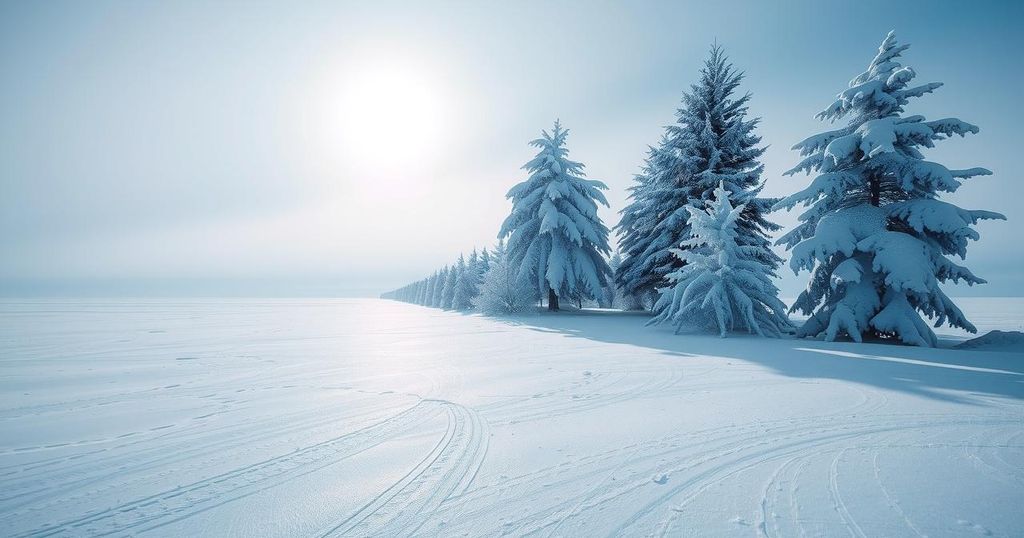Severe Winter Storm Predicted: Temperatures Dropping to Record Lows Across the U.S.

Millions of Americans will face extreme cold as Arctic air collides with a storm system, leading to hazardous conditions and potential record-breaking low temperatures. Areas affected by previous flooding are particularly challenged as recovery efforts coincide with approaching snowstorms. Emergency crews continue to execute rescues, while officials advise residents to seek safe heating solutions as temperatures plunge.
Dangerously low temperatures are set to affect millions of Americans, leading to significant disruptions due to an approaching winter storm. Arctic air will converge with a storm system from the Rocky Mountains, resulting in severe winter weather conditions spanning from the Central United States to the mid-Atlantic region. Additionally, the frigid temperatures and snowfall challenge recovery efforts in areas of Kentucky, West Virginia, and Virginia that are still coping with the effects of recent deadly flooding.
At least 15 fatalities have been reported from the recent storm, including tragedies in West Virginia and Kentucky. Two individuals reportedly succumbed to hypothermia in Jefferson County, Kentucky. Governor Andy Beshear highlighted the severity of the weather, stating, “That should tell all of us the weather conditions are as dangerous as that water is.”
The cold front is expected to intensify throughout the week, with nearly three-quarters of the U.S. population forecasted to experience below-freezing temperatures by Friday. This extreme cold may reach up to 50 degrees below the February average, with projections for over 270 record-low temperatures across 27 states.
A new winter storm is projected to bring between 3 to 6 inches of snow to areas affected by flooding in Kentucky and potentially over 6 inches in parts of West Virginia, complicating the cleanup efforts. Emergency crews in Kentucky and West Virginia have conducted numerous flood rescues since the storms began, illustrating the urgency of their operations ahead of the impending severe weather.
Authorities in Kentucky are transitioning their focus from immediate rescue missions to recovery efforts aimed at removing debris and restoring access for affected communities. Power restoration is ongoing as around 4,000 customers remain without electricity, creating concerns about safe heating access as temperatures plunge.
The coldest air of the season is sweeping through northern regions, with some locales in Montana and North Dakota experiencing dangerous wind chills approaching 60 degrees below zero. Cold weather alerts now encompass over 60 million Americans, signaling a broad and life-threatening chilling effect across the Plains, Midwest, Great Lakes, and Northeast.
As the winter storm progresses, significant snowfall is expected from Kansas to the central Appalachians, with forecasts predicting over a foot in some areas. Emergency declarations have been issued across multiple states, including Arkansas, North Carolina, and Virginia, emphasizing the potential impact of these weather events on local infrastructure and safety.
Texas cities like Dallas and Houston are bracing for sharp temperature declines following relatively mild conditions. Wind chills will pose further risks, with conditions reaching dangerous levels in the Northern Plains and extending into southern regions as frigid air moves through.
In summary, as a severe winter storm brings extreme cold and substantial snowfall to much of the United States, emergency services are working diligently to save lives and provide aid for those affected by both flooding and snow. Authorities urge residents to prepare for life-threatening conditions and consider alternatives for warmth and safety.
The article highlights the impending severe winter storm and record-breaking low temperatures affecting millions across the United States. With dangerous conditions exacerbating recovery from recent flooding in states like Kentucky and West Virginia, emergency services are engaged in critical rescue operations. The broad cold wave could lead to historic temperature lows, prompting states of emergency in various regions. Citizens are encouraged to prioritize safety as frigid weather approaches.
Original Source: www.kten.com






